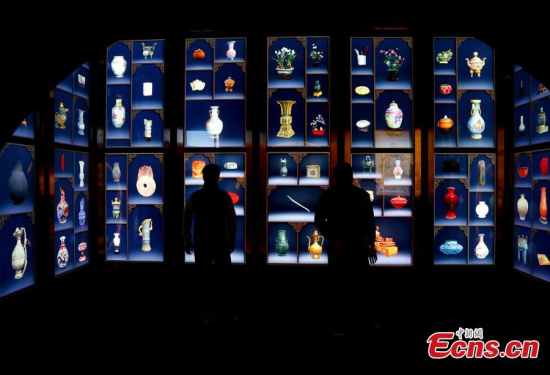
Visitors at the newly opened digital center of the Palace Museum in Beijing, Oct. 10, 2017. Visitors can now understand the rich history and culture through all kinds of new technology in the center. (Photo: China News Service/Du Yang)
Since 1420, the Forbidden City has served as the royal residence as well as the political center for Chinese emperors. On October 10, 1925, the palace tore off it's enigmatic mask, opening its door to visitors in the new role of a public museum, marking the modernization of social ethos in China.
Tuesday was the 92nd anniversary of this re-identification of the Palace Museum, and it celebrated by further embracing modernity, officially scrapping paper tickets altogether and digitizing the service.
Prospective visitors can book tickets online with a local ID card or passport. The museum has a daily cap on the number of visitors at 80,000, to minimize potential damage to the world's largest wooden building block.
China's booming digital economy, unfathomable during imperial times, has been a key catalyst for the upgrade. Ticket payment can be completed on smart devices with Alipay or Wechat – apps that provide Paypal-like services. Staff are onsite to guide people who are unfamiliar with the means of payment or the online booking system if the daily visit quota isn't met.
The former ticket hut could be transformed into a "Chinese cultural space" where tourists can have a break and enjoy films about the Palace's history, says Shan Jixiang, curator of the Palace Museum.
The online booking system was launched in 2011. It used to take about 15 minutes to queue for ticket, the museum's management estimated.
During China's National Day holiday from October 1 to 8, known locally as the Golden Week, the museum was the most visited tourist attraction in Beijing. A total of 610,000 tickets were sold.
Having digitized a large portion of its collection, the museum is always on the front line of employing modern technologies to enhance the visitor experience. One of its recent experiments is a VR demonstration of the Hall of Mental Cultivation, a combination of the living room and bedroom for Qing emperors for 200 years.
The museum's management of its social network is also a success. It has more than 4 million followers on Weibo, Chinese version of Twitter.


















































